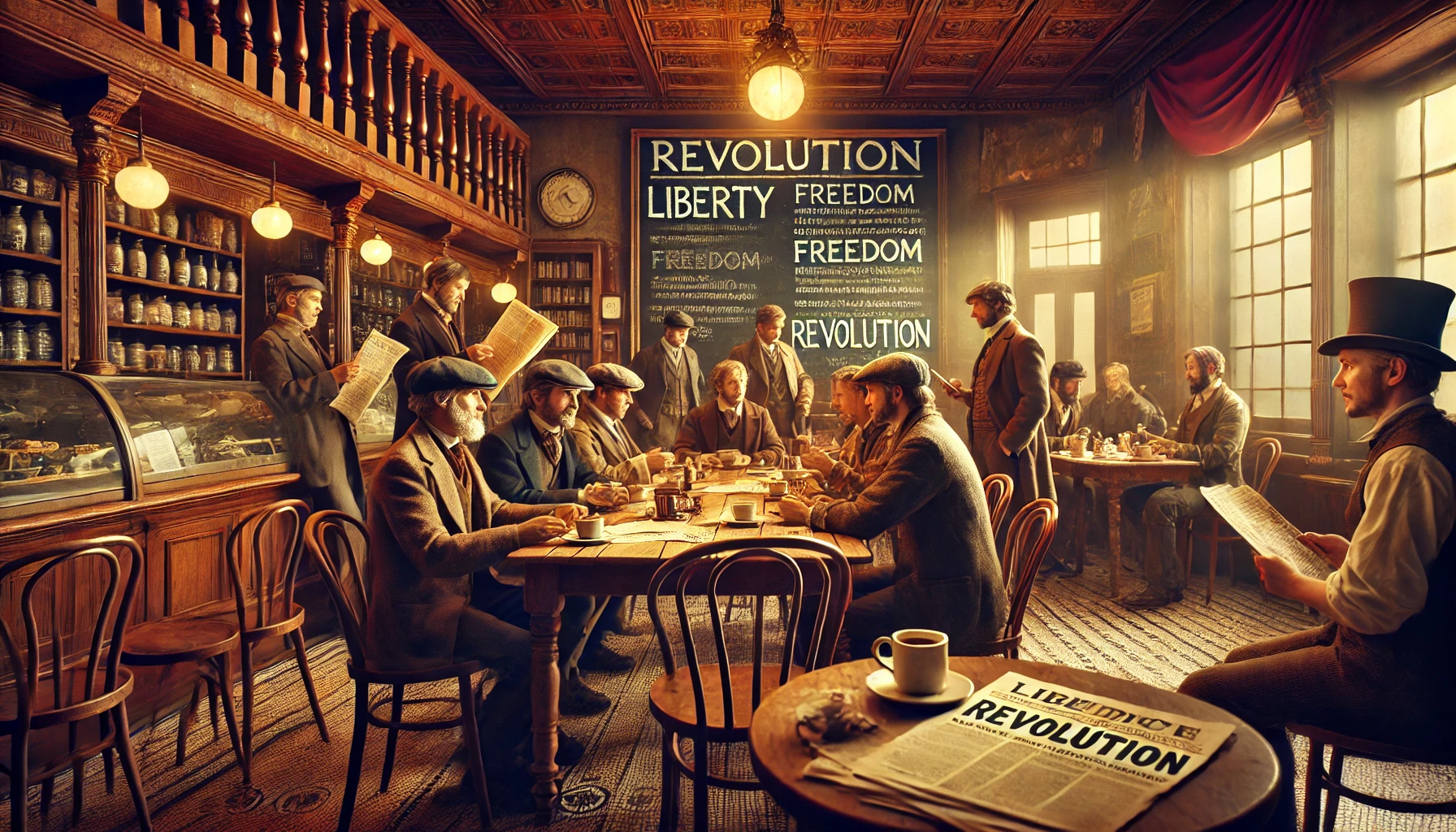From smoky coffeehouses in 17th-century London to revolutionary salons in 18th-century Paris, cafés have long served as more than just places to enjoy a drink. They’ve been incubators of dissent, engines of change, and safe havens for radical ideas.
Throughout history, coffee has energized not only the body but also the minds behind revolutions—offering a space for free thought, political dialogue, and intellectual rebellion.
In this article, we’ll explore how coffee and cafés helped fuel some of the world’s most transformative social and political movements.
The Rise of the Coffeehouse
When coffee first arrived in Europe in the 1600s, it didn’t just bring a new beverage—it brought a new social institution: the coffeehouse.
Unlike taverns, which were loud and alcohol-fueled, coffeehouses were spaces for sobriety, discussion, and reflection. With minds sharpened by caffeine instead of dulled by drink, patrons gathered to read, debate, and question the status quo.
Coffeehouses quickly became known as “penny universities”—a place where, for the price of a cup, you could engage in lively conversation and intellectual exchange.
London Coffeehouses and Political Disruption
In 17th-century London, coffeehouses multiplied rapidly, often attracting writers, merchants, philosophers, and political dissidents. Newspapers were read aloud, pamphlets were passed around, and ideas were freely exchanged.
Fearing that these discussions could incite rebellion, King Charles II attempted to ban coffeehouses in 1675, claiming they were breeding grounds for “idle and disaffected persons.” The public outcry was so strong, the ban lasted only 11 days.
These spaces gave rise to many foundational institutions:
- The London Stock Exchange grew from Jonathan’s Coffee-House
- Lloyd’s of London insurance market began in a coffeehouse
- Political clubs and newspapers flourished among the café tables
Parisian Cafés and the French Revolution
In 18th-century France, cafés became the epicenter of revolutionary debate. Writers, philosophers, and revolutionaries gathered to read Rousseau and Voltaire, question royal authority, and plan uprisings.
The Café Procope
Established in 1686, the Café Procope was a favorite of Enlightenment thinkers like Diderot, Robespierre, and Marat. It became a hotspot for fiery discussions that laid the groundwork for the French Revolution.
Cafés across Paris buzzed with political tension as citizens demanded liberty, equality, and fraternity—with a strong cup of coffee in hand.
Vienna’s Intellectual Coffeehouses
The Viennese café tradition is legendary—not just for coffee and cake, but for its role in fostering ideological and artistic revolutions.
- Writers like Stefan Zweig, Karl Kraus, and Arthur Schnitzler
- Artists like Gustav Klimt and Egon Schiele
- Thinkers like Sigmund Freud and Theodor Herzl
Cafés became living rooms for the intelligentsia, where psychoanalysis, Zionism, and modernism were first scribbled on napkins and argued over espresso.
American Cafés and Civil Rights
In the United States, cafés and diners played a key role in civil rights organizing, particularly during the 1950s and 60s.
- College cafés became meeting grounds for students protesting segregation and the Vietnam War
- Urban coffeehouses supported poetry, folk music, and counterculture
- Cafés served as safe spaces for LGBTQ+ communities, especially in San Francisco and New York
Even the modern indie café movement continues this tradition—often tied to activism, local politics, and artistic expression.
Coffee and the Arab Spring
In recent decades, cafés across the Middle East and North Africa have remained spaces of political engagement.
During the Arab Spring, many young activists met in local cafés to:
- Plan protests
- Share news and updates
- Connect over Wi-Fi
- Organize via social media
Cafés once again served as the nerve centers of revolution, blending the old tradition of face-to-face dialogue with modern tools for mobilization.
Why Cafés Empower Movements
What makes cafés such powerful tools for political change?
- Accessibility: Open to all social classes
- Anonymity: A crowd offers privacy
- Connection: Shared space fosters community
- Energy: Caffeine stimulates discussion and alertness
- Tradition: A historic link to resistance and free thought
They provide the perfect conditions for challenging authority while building relationships and exchanging ideas.
Final Thoughts: More Than a Beverage
Throughout history, coffee has been the fuel of revolution—not just in cups, but in conversations. From French radicals and American students to Middle Eastern activists and European intellectuals, the café has remained a sacred space where people gather to imagine and build a better world.
So the next time you sit in a coffee shop, remember: you’re not just sipping caffeine—you’re sitting in a place where history has been written, debated, and stirred into every cup.
